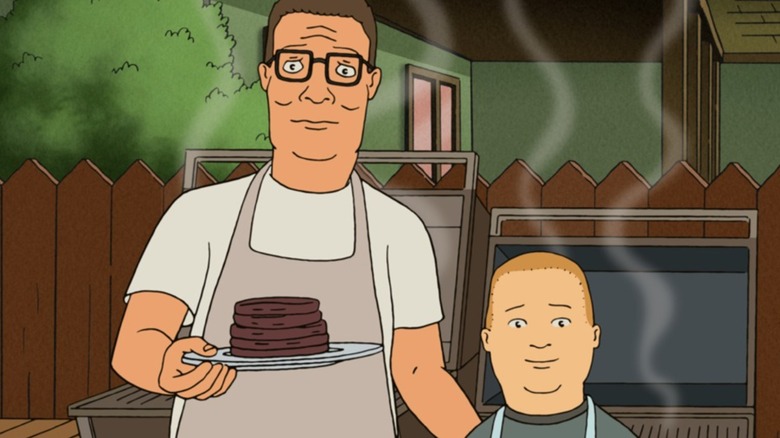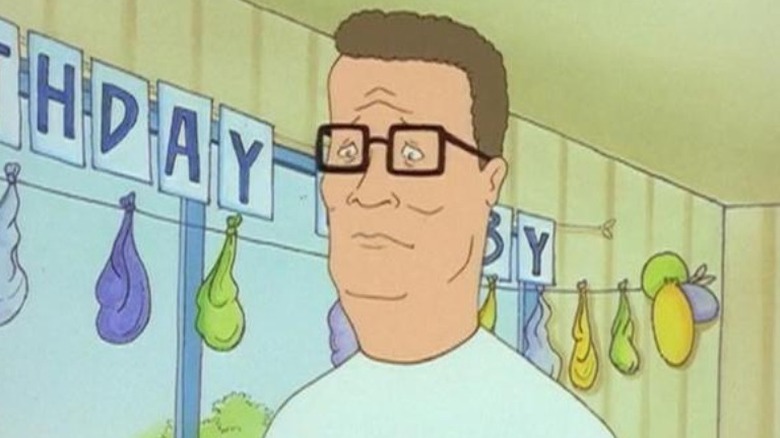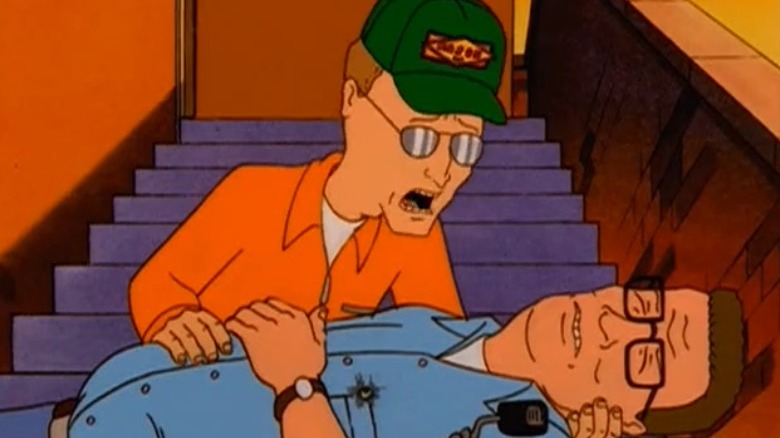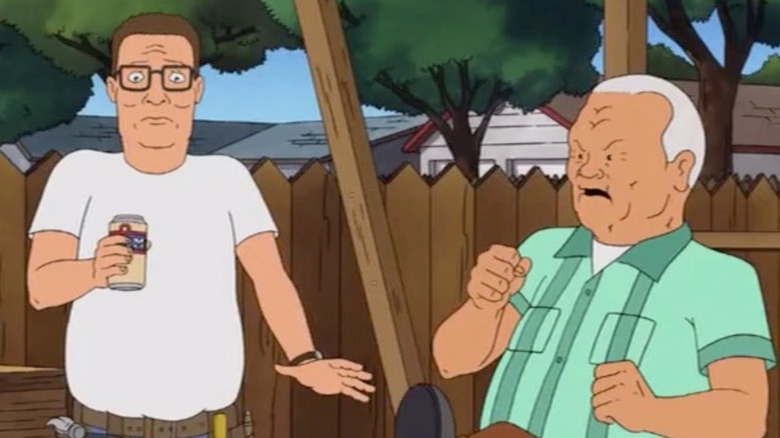
When it came to primetime adult animated sitcoms of the '90s and early '00s, "King of the Hill" was somewhat of an outlier. It was steeped in suburban realism, trusting the audience to find the humor in co-creator Mike Judge's observational, mundane sensibility. While the show's contemporaries like "Family Guy" or "The Simpsons" (which sparked competition with the show over its use of guest stars) embraced a cartoony wackiness, "King of the Hill" adopted a relaxed, comfortable tone. And who better to command that tone than a character like Hank Hill (Judge)?
For one thing, Hank was an unusual choice to lead a sitcom. Where "The Simpsons" and "Family Guy" made a point of their lead patriarchs being very dumb and oblivious, Hank was smart and competent. Superficially, he probably looked a little boring, and there was little about Hank that would seem to lend itself to comedy. But the genius of the show was that his interests and concerns — about family, morality, and social changes he couldn't exactly grasp — were so specifically drawn, and could turn him into the perfect foil.
Even though Hank was a well-observed character fit for Mike Judge's dry comedic stylings, the show couldn't just rely on him. Judge's original design for the show placed a great deal of emphasis on Hank and his struggles dealing with bureaucratic middlemen and changing society. When the executives at Fox began pushing for the show's development in earnest, Greg Daniels was brought on as co-creator, and the big change didn't involve the protagonist but the world around him.
A Regular Guy

In many ways, a show like "King of the Hill" demands a character like Hank. He was a fairly regular man's man interested in football, fishing, and of course, propane, the gas he sells for a living and likens to his mistress at one point. The nature of the show and its stance on realism and mundanity meant that a "normal guy" like Hank was an appropriate center. Depending on the episode, he could be heroic, he could be neurotic, and he was always a confused but committed father to Bobby (Pamela Adlon). But for him to be even funnier, things would need to change.
Instead, the eccentric supporting cast would do a lot of the heavy lifting for the comedy, with their desperation and neuroses running directly up against Hank's sturdy professionalism, which he displays whether he's working or at home. Jokes were never a top priority for the show, but its highly specific depictions of characters from Hank's oldest friends, to his coworkers, to his family make it extremely funny and realistic.
As co-creator Greg Daniels recalled in the "Making of King of the Hill" documentary, the basic meat of the show was there before he came on to help develop it, and it came largely from Mike Judge's observational humor.
Judge had spent a decent amount of his life in the suburbs of Dallas, and based the show off of character types he'd gotten to know there. Speaking of the show's origins, Judge told IGN about a drawing "of just four guys with beers standing out in front of the fence, kind of like I used to see when I'd look out my kitchen window," and that became the show. Daniels' task became giving life to that world, those four guys.
The Daniels Touch

Many of the characters for which "King of the Hill" is so well-known, and so acclaimed, actually didn't really exist before Greg Daniels was brought in to help Mike Judge develop it. At least not as they are currently known. Perennial smoker and bug exterminator Dale Gribble (Johnny Hardwick), for instance, is best known for the paranoid conspiracy theories that guide his every action, but that was a Daniels addition. So was the ironic punchline that, despite his paranoia, he missed his wife having an affair for 14 years.
In the "Making of King of the Hill" documentary, Daniels recalled what a big part of his writing job was with the show. Mike Judge had convinced him of his vision for the show by driving around Austin with him, looking around at neighborhoods and massive chain "hypermarkets," as well as the local propane stores that would clearly serve as the inspiration for Hank's beloved Strickland Propane. Daniels didn't want to mess with the vision, but to heighten it by figuring out how the supporting cast could serve it.
Besides Dale and his family, Daniels began developing other characters around Hank. There was Hank's diminutive, war hero father Cotton (Toby Huss), whose browbeating of his son lent complexity to Hank's own straightforward professionalism. And Hank's teenage niece Luanne (Brittany Murphy) also presented a vastly different character for Hank to contend with.
These characters became so essential to the show that, even if they weren't huge parts of Mike Judge's favorite episodes, they became indispensable pieces of the ensemble.
The Formula

Mike Judge has a simple formula for writing a good "King of the Hill" script, and it involves taking the straitlaced, strong-willed Hank and making him a fish out of water.
Because of Greg Daniels' additions, the formula could almost be self-perpetuating by giving Hank constant battles to fight, whether with his family or friends. And you could always cut back to the alleyway where Hank, Dale, Boomhauer (also Judge), and Bill (Stephen Root) would be drinking beer in front of a fence, keeping that casual, mundane feeling.
Fox had brought Greg Daniels on to "King of the Hill" early in its development so that he could rewrite the pilot. His work in "The Simpsons" writers' room had produced a number of gems, and his comedic sensibilities mixed with Judge's to create the magic formula for the show. As Jaime Weinmann noted in a history of the show for Maclean's, this mix of comedic sensibilities, of "comparable but dissimilar talents," was a rarity for a show of this stature.
It gave the show a sense of emotional richness on top of Judge's brilliant observational comedy. The mix of Judge's ideal formula with Daniels' savvy, writerly instincts made the show what it was. And Hank, even if he seemed like a fairly standard, middle-aged white guy in Texas, got the comedic spotlight because of that mix.
Read this next: The 27 Best Simpsons One-Off Characters Ranked
The post Getting King Of The Hill Up To Executives' Standards Meant Changing Everything But Hank appeared first on /Film.
0 Commentaires